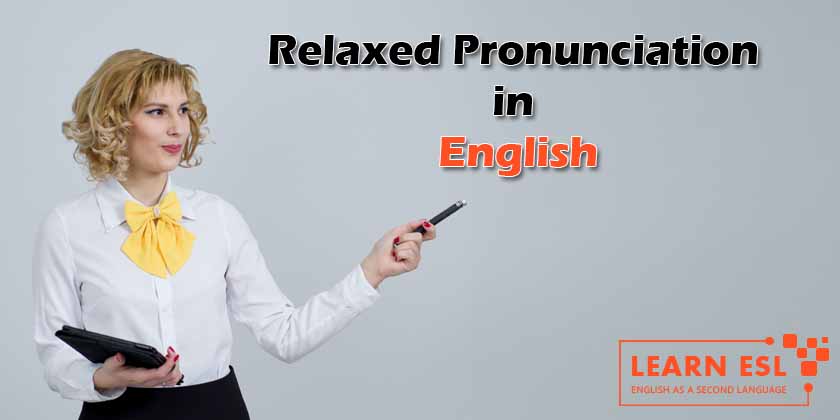
Relaxed pronunciation is the combination of two words into one and is used often in speaking (but not in writing). Using these words is a great way to make yourself sound more like a native speaker.
The following sections contain common words said with relaxed pronunciation in American English and a commonly written indication of this pronunciation where applicable.
Relaxed Pronunciation in English
Take a look at these examples of relaxed pronunciation, and practice until you sound like a native speaker! Pay close attention to the example sentences: each one provides a great activity suggestion for students who are learning English.
Of, Have, And To
“Of, have, and to” The words (of, to, and have) all tend to elide to nothing more than a schwa [ə] in many common situations. This sometimes leads to spelling confusion, such as writing “I could of…” instead of “I could have…”.
- could have: [ˈkʊɾə], “coulda”
- must have: [ˈmʌstə], “musta”
- should have: [ˈʃʊɾə], “shoulda”
- would have: [ˈwʊɾə], “woulda”
- it would: [ˈɪɾə], “itta”
- a lot of: [əˈlɑɾə], “a lotta”
- kind of: [ˈkaɪɾə], “kinda”
- out of: [ˈaʊɾə], “outta”
- sort of: [ˈsɔɹɾə], “sorta”
- going to: [ˈgʌnə], “gonna”
- got to: [ˈgɑɾə], “gotta”
- have to: [ˈhæftə], “hafta”
- want to: [ˈwʌnə], “wanna”
You:
- did you: [ˈdɪdʒə], “didja”
- don’t you: [ˈdoʊntʃə], “doncha”
- got you: [ˈgɑtʃə], “gotcha”
- get you: [ˈgɛtʃə], “getcha”
- would you: [ˈwʊdʒə], “wouldja”
Other:
- give me: [ˈgɪmi], “gimme”
- is he: [ˈɪzi], “izee”
- is it: [zɪt], “zit”
- let me: [ˈlɛmi], “lemme”
- don’t know: [dəˈnoʊ], “dunno”
- probably: [ˈpɹɑli], “prolly”
- what is that: [ˌwʌˈsæt], “wussat”
- what is up: [wəˈsʌp], “wassup”
- what is up: [sʌp], “sup”
- What are you: [ˈwʌtʃə], “whatcha”
- what do you: [ˈwʌɾəjə], “whaddaya”
- you all: [jɑl], “y’all”
Examples of Relaxed Pronunciation in Sentences
- What are you going to do?
- Whatcha going to do?
- Whatcha gonna do?
Or
- Do you want a book?
- Do you wanna book?
- D’you wanna book?
- D’ya wanna book?
- Ya wanna book?
- Wanna book?
Note: These informal contractions are not “correct” English. Do not use them in a written exam, for example, except in appropriate situations.
More Examples:
ain’t = am not/are not/is not
- I ain’t sure.
- You ain’t my boss.
ain’t = has not/have not
- I ain’t done it.
- She ain’t finished yet.
gimme = give me
- Gimme your money.
- Don’t gimme that rubbish.
- Can you gimme a hand?
gonna = going to
- Nothing’s gonna change my love for you.
- I’m not gonna tell you.
- What are you gonna do?
gotta = (have) got a+noun
- I’ve gotta run.
- I gotta run.
- She hasn’t gotta penny.
- Have you gotta car?
gotta = (have) got to
- I’ve gotta go now.
- I gotta go now.
- We haven’t gotta do that.
- Have they gotta work?
kinda = kind of
- She’s kinda cute.
lemme = let me
- Lemme go!
wanna = want to
- I wanna go home.
wanna = want a+noun
- I wanna coffee.
whatcha = what are you
- Whatcha going to do?
whatcha = what have you)
- Whatcha got there?
ya = you
- Who saw ya?
Would you like to enhance your speaking power in English even more? Check out the useful articles below:
- What are consonant clusters in English?
- The American Pronunciation
- The American T Sound
- What are Reductions in English Language?
- Pronunciation of ED Endings in Regular Verbs
- American pronunciation of TH
- Phrasal Verbs Exercises With Answers
